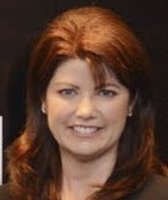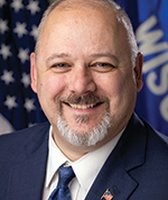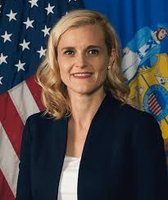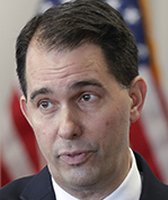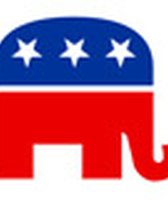Stand up for the facts!
Our only agenda is to publish the truth so you can be an informed participant in democracy.
We need your help.
I would like to contribute
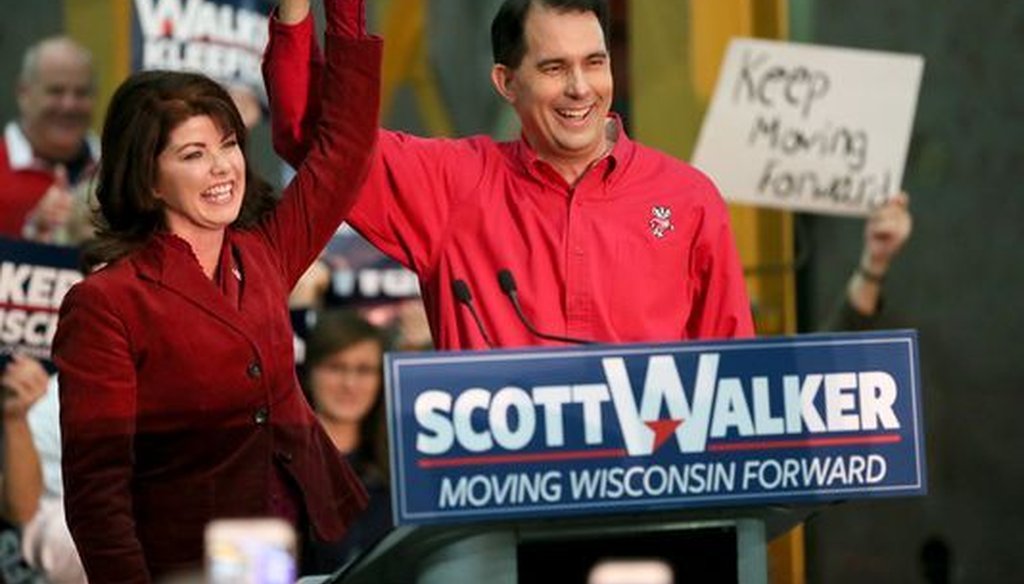
Wisconsin Lt. Gov. Rebecca Kleefisch and Gov. Scott Walker announced their re-election bids on Nov. 5, 2017. (Michael Sears/Milwaukee Journal Sentinel)
Kleefisch didn’t have the power to cut taxes on her own as lieutenant governor
If Your Time is short
-
Kleefisch did travel the state talking with residents and businesses about tax reforms during the budget process
-
She also routinely participated in budget meetings with former Gov. Walker and members of his cabinet
-
But that doesn’t change the fact that the lieutenant governor just isn’t responsible for introducing, voting on or signing measures like tax cuts into law.
As she runs for the Republican nomination for governor, Rebecca Kleefisch is – understandably – touting the accomplishments during the Gov. Scott Walker administration.
Kleefisch, of course, was lieutenant governor, not governor. So, her claim in a recent TV ad caught our attention. In the ad, released March 28, 2022, Kleefisch is seen speaking to a crowd declaring:
"As your lieutenant governor, I beat the liberal mob, I cut your taxes, and I protected your freedoms."
Is that accurate?
Can the lieutenant governor – who does not introduce or write legislation, and does not sign or veto bills – cut taxes?
Let’s take a closer look at the claim, and what role – if any – Kleefisch played.
Tax cuts did take place during Walker administration
First, let’s take a look at taxes during the time Kleefisch served under Walker, who served from 2011 to 2019.
During that time PolitiFact Wisconsin looked at many tax-cut claims. Indeed, there were more than $8 billion in tax cuts between 2011 and the time of a 2018 fact check. The nonpartisan state Legislative Fiscal Bureau provided the estimate of about $8.47 billion in tax savings, between income and franchise tax reductions, property tax reductions, and other cuts.
So, what was Kleefisch’s role?
When asked for backup, Kleefisch’s campaign team said she attended most budget briefings during the Walker administration, and during discussions around the 2017-19 budget traveled the state with the budget director to tout the plan.
Her campaign also shared an April 1, 2014 article from the Wisconsin State Journal, headlined "Once ‘radioactive,’ Rebecca Kleefisch has become a ‘trusted ally and lieutenant’," in which Walker said that Kleefisch was quick to get involved after her election.
"She was directly involved in the budget planning process during the transition period and then in each of the budget periods once we took office," it quotes Walker as saying.
The article also noted how Kleefisch led tax roundtables ahead of the 2015-’17 budget with former Revenue Secretary Richard Chandler, and how the feedback collected at those roundtables was directly tied into plans.
Walker also testified to Kleefisch’s involvement in conversations regarding the budget:
"Rebecca Kleefisch immediately joined me and other key members of our transition team for the daily budget briefings," he said in a statement.
Chandler, who served as the Department of Revenue Secretary during the Walker administration, said Kleefisch organized and sat through roundtables about taxes, eventually pulling together a report that was used during budget sessions.
"She brought back a lot of input from all of those discussions," Chandler said.
All of that may be true, but experts told us Kleefisch overstates her role in the ad.
John Witte, a professor of political science and public affairs at the University of Wisconsin-Madison, noted the formal budget is submitted every two years by the governor in Wisconsin, not the lieutenant governor.
"It is possible, and even likely, that she had some input before the submission," Witte said in an email. "How much is probably unknowable without detailed access to documents, memos, etc."
To be sure, according to the state constitution and state laws, lieutenant governors in Wisconsin have no role in approving tax cuts or any other types of legislation. What’s more, Walker shaped many of the tax cuts, but Republicans who control the Legislature also put their stamp on them.
So while Kleefisch may have been involved in the talks surrounding budgets and tax cuts during the Walker administration, she had no direct role in cutting those taxes.
Our ruling
In a TV ad, Kleefisch declared: "As your lieutenant governor, I beat the liberal mob, I cut your taxes.
Taxes were surely cut during the Walker administration – to the tune of more than $8 billion during their eight years in office.
Kleefisch participated in budget discussions and held listening sessions across the state. And she may have advocated for those tax cuts, but the lieutenant governor simply isn’t responsible for voting on or signing tax cuts or other types of legislation into law.
Our definition of Mostly False is a statement that "contains an element of the truth but ignores critical facts that would give a different impression."
That fits here.
Our Sources
Rebecca Kleefisch, Youtube, March 28, 2022
PolitiFact, "Scott Walker’s big re-election tax cut tout: $8 billion during his time as Wisconsin governor," June 22, 2018
Email conversation with John Witte, professor UW-Madison, April 4, 2022
Email conversation with Alec Zimmerman, communications director for Kleefisch campaign, April 5, 2022
Wisconsin State Journal, "Once ‘radioactive,’ Rebecca Kleefisch has become a ‘trusted ally and lieutenant," April 1, 2014
Conversation with Richard Chandler, April 11, 2022
Wisconsin state constitution, April 8, 2022
Wisconsin state statutes, April 8, 2022
Browse the Truth-O-Meter
More by Laura Schulte
Kleefisch didn’t have the power to cut taxes on her own as lieutenant governor
Support independent fact-checking.
Become a member!
In a world of wild talk and fake news, help us stand up for the facts.

